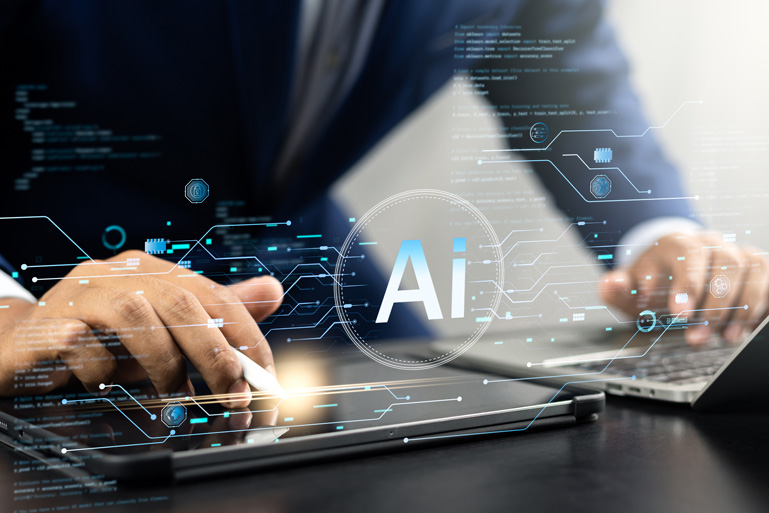How is AI being used in the accounting sector and what are its limitations? Accounting specialist, Ashleigh Wangmann, shares her insights.
Insights Author: Ashleigh Wangmann
Artificial Intelligence (AI) is changing the world at an unprecedented pace, transforming the way we live and work. But how is it impacting the accounting sector? Here, our accounting specialist, Ashleigh Wangmann shares her insights.
From workplace automation and smart home devices to AI powered assistants like Siri and advancements in healthcare, there’s no doubt that AI is here to stay. In fact, studies show it’s only going to increase.

In 2024, KPMG surveyed 1,800 business leaders across 10 countries, including 100 from Australia.
Their findings show that, while AI only currently claims around 10 percent of IT budgets, significant increases in investment are on the way. Almost 50 percent of the respondents anticipate a 25 percent rise in AI investment in 2025.
So, how is AI shaping the accounting industry? How is it improving efficiency and decision making across the sector and what are its limitations?
Compliments existing data analytic tools
Accountants are finding value in using AI to complement their existing accounting software and data analytics tools, such as Power BI, Tableau, TM1, and SQL.
Data analytics tools are already highly effective on their own. However, adding AI increases their capabilities, allowing them to handle more complex analytical tasks at every stage of finance.
Combining data analytics tools with AI can greatly improve business operations and strategic decision making. It allows businesses to gain deeper insights beyond the current numbers, streamline processes and reduce manual workloads.
Automation and reconciliation
Accountants are using AI to automate routine tasks like data entry and reconciliation of financial documents. This reduces manual work and errors, freeing up accountants to focus on the bigger picture.
Boosting efficiency and accuracy allows accountants to analyse data faster, while monitoring financial performance and helping businesses stay ahead.
Future forecasting
AI can use financial information to forecast future trends. It can use data like cash flow, revenue and expenses to help businesses allocate resources more effectively, create stronger sales plans and make more informed strategic decisions.
AI can also reveal trends and insights that might be more difficult for a human to identify.
Invoice processing and expense management:
AI streamlines invoice processing by analysing documents to accurately capture key information. It matches this data with purchase orders and automates payment, improving efficiency.
AI assists in following up on outstanding invoices by sending automatic reminders to customers. It also streamlines expense management by categorising expenses and identifying irregularities.
Fraud detection
AI algorithms can identify unusual patterns and anomalies within large datasets and learn to recognise patterns that might signal fraudulent activities.
Highlighting these anomalies allows businesses to pinpoint potential security gaps and strengthen their existing security measures.
As the algorithms get better at their job, they can spot fraudulent patterns more easily and quickly.
Improving Customer Service
AI-powered chatbots and virtual assistants can provide 24/7 support, handling common questions about billing, payments and account status. This capability reduces wait times and boosts overall service efficiency.
AI reduces processing errors and analyses financial data to offer customers more accurate insights and recommendations to help them make well informed financial decisions.

Long term use of AI within the accounting sector
The advantages of using AI in accounting are unquestionable. In addition to the above, its benefits stretch to financial reporting, tax compliance, risk assessment, document management and bank reconciliation, to name a few.
But will it completely replace the role of accountants? I don’t think so.
Data integrity – a system is only as good as its user
AI-powered tools may use complex algorithms and machine learning to analyse data and make decisions, but it can be difficult for humans to understand how these decisions are made.
Connections and relationships
No matter how advanced AI gets, it cannot replace the authenticity of human connections. AI can simulate conversation and provide information, but it lacks the ability to offer genuine insights, the story beyond the numbers and the financial advisory that’s important in business.

Need to tighten cybersecurity measures
When using cloud-based AI systems, companies must strengthen their cybersecurity measures to protect sensitive data and ensure secure operations.
Failure to do this exposes companies to significant risks, including data breaches, financial loss and reputational damage which we have seen across numerous large organisations throughout Australia over the past few years.
Cyberattacks targeting weak systems can cause downtime, disrupt operations and mess with AI models, leading to poor decision-making and harm to business outcomes.
Accountants are becoming more intuitive
Many accountants enjoy working directly with data to understand how decisions are made, rather than depending on AI systems that might make choices without human insight.
This hands-on approach helps them develop valuable skills that boost their careers and keep them competitive in a job market where digital know-how is key.
Data analytics gives them more control and clarity, enabling them to make smarter decisions without the potential drawbacks and uncertainties associated with AI.
If you’re looking to fill accounting roles in your business, we can help. With our wide network of talented accounting candidates, we’re sure to find the right match for your needs. Get Ashleigh today!





